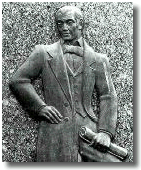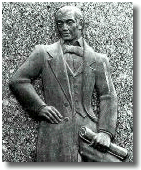Cenotaph
. . . . . . . . . .
Felipe Enrique Neri, colonizer, legislator, and self-styled Baron de Bastrop, was born Philip Hendrik Nering Bögel in Paramaribo, Dutch Guiana, on November 23, 1759, the son of Conraed Laurens Nering and Maria Jacoba (Kraayvanger) Bögel. He moved to Holland with his parents in 1764, and in 1779 enlisted in the cavalry of Holland and Upper Issel. Bögel married Georgine Wolffeline Françoise Lijcklama à Nyeholt in Oldeboorn, Holland, on April 28, 1782; they had five children. The family settled in Leeuwarden, where Bögel served as collector general of taxes for the province of Friesland.
His military service, marriage, and appointment as tax collector suggest that he was a staunch supporter of the aristocracy during the late-eighteenth-century revolutionary period. He always gave the French invasion of Holland as his reason for leaving the country, but he actually left for different reasons. In 1793 he was accused of embezzlement of tax funds and fled the country before he could be brought to trial. After the Court of Justice of Leeuwarden offered a reward of 1,000 gold ducats to anyone who brought him back, Bögel adopted the title Baron de Bastrop.
By April 1795 he had arrived in Spanish Louisiana, where he represented himself as a Dutch nobleman. During the next decade he received permission from the Spanish government to establish a colony in the Ouachita valley and engaged in several business ventures in Louisiana and Kentucky. After Louisiana was sold to the United States in 1803, Bastrop moved to Spanish Texas and was permitted to establish a colony between Bexar and the Trinity River. In 1806 he settled in San Antonio, where he had a freighting business and gained influence with the inhabitants and officials. In 1810 he was appointed second alcalde in the ayuntamiento at Bexar.
One of his most significant contributions to Texas was his intercession with Governor Antonio María Martínez on behalf of Moses Austin in 1820. Because of Bastrop, Martínez reconsidered and approved Austin's project to establish an Anglo-American colony in Texas. After Austin's death, Bastrop served as intermediary with the Mexican government for Stephen F. Austin, who would have encountered many more obstacles but for Bastrop's assistance and advice. In July 1823 Luciano García appointed Bastrop commissioner of colonization for the Austin colony with authority to issue land titles. On September 24, 1823, the settlers elected Bastrop to the provincial deputation at Bexar, which in turn chose him as representative to the legislature of the new state of Coahuila and Texas in May 1824.
During his tenure as representative of Texas at the capital, Saltillo, Bastrop sought legislation favorable to the cause of immigration and to the interests of settlers; he secured passage of the colonization act of 1825; and he was instrumental in the passage of an act establishing a port at Galveston. His salary, according to the Mexican system, was paid by contributions from his constituents. The contributions were not generous; Bastrop did not leave enough money to pay his burial expenses when he died, on February 23, 1827. His fellow legislators donated the funds to reimburse Juan Antonio Padilla for the expenses of the funeral. Bastrop was buried in Saltillo.
Even in his last will and testament, Bastrop continued to claim noble background, giving his parents' names as Conrado Lorenzo Neri, Baron de Bastrop, and Susana Maria Bray Banguin. Some of his contemporaries believed him to be an American adventurer; historians have thought him to be a French nobleman or a Prussian soldier of fortune. Only within the last half-century have records from the Netherlands been found to shed light on Bastrop's mysterious origins. Although his pretensions to nobility were not universally accepted at face value even in his own lifetime, he earned respect as a diplomat and legislator. Bastrop, Texas, and Bastrop, Louisiana, as well as Bastrop County, Texas, were named in his honor. tshaonline.org
. . . . . . . . . .
Cenotaph
. . . . . . . . . .
Felipe Enrique Neri, colonizer, legislator, and self-styled Baron de Bastrop, was born Philip Hendrik Nering Bögel in Paramaribo, Dutch Guiana, on November 23, 1759, the son of Conraed Laurens Nering and Maria Jacoba (Kraayvanger) Bögel. He moved to Holland with his parents in 1764, and in 1779 enlisted in the cavalry of Holland and Upper Issel. Bögel married Georgine Wolffeline Françoise Lijcklama à Nyeholt in Oldeboorn, Holland, on April 28, 1782; they had five children. The family settled in Leeuwarden, where Bögel served as collector general of taxes for the province of Friesland.
His military service, marriage, and appointment as tax collector suggest that he was a staunch supporter of the aristocracy during the late-eighteenth-century revolutionary period. He always gave the French invasion of Holland as his reason for leaving the country, but he actually left for different reasons. In 1793 he was accused of embezzlement of tax funds and fled the country before he could be brought to trial. After the Court of Justice of Leeuwarden offered a reward of 1,000 gold ducats to anyone who brought him back, Bögel adopted the title Baron de Bastrop.
By April 1795 he had arrived in Spanish Louisiana, where he represented himself as a Dutch nobleman. During the next decade he received permission from the Spanish government to establish a colony in the Ouachita valley and engaged in several business ventures in Louisiana and Kentucky. After Louisiana was sold to the United States in 1803, Bastrop moved to Spanish Texas and was permitted to establish a colony between Bexar and the Trinity River. In 1806 he settled in San Antonio, where he had a freighting business and gained influence with the inhabitants and officials. In 1810 he was appointed second alcalde in the ayuntamiento at Bexar.
One of his most significant contributions to Texas was his intercession with Governor Antonio María Martínez on behalf of Moses Austin in 1820. Because of Bastrop, Martínez reconsidered and approved Austin's project to establish an Anglo-American colony in Texas. After Austin's death, Bastrop served as intermediary with the Mexican government for Stephen F. Austin, who would have encountered many more obstacles but for Bastrop's assistance and advice. In July 1823 Luciano García appointed Bastrop commissioner of colonization for the Austin colony with authority to issue land titles. On September 24, 1823, the settlers elected Bastrop to the provincial deputation at Bexar, which in turn chose him as representative to the legislature of the new state of Coahuila and Texas in May 1824.
During his tenure as representative of Texas at the capital, Saltillo, Bastrop sought legislation favorable to the cause of immigration and to the interests of settlers; he secured passage of the colonization act of 1825; and he was instrumental in the passage of an act establishing a port at Galveston. His salary, according to the Mexican system, was paid by contributions from his constituents. The contributions were not generous; Bastrop did not leave enough money to pay his burial expenses when he died, on February 23, 1827. His fellow legislators donated the funds to reimburse Juan Antonio Padilla for the expenses of the funeral. Bastrop was buried in Saltillo.
Even in his last will and testament, Bastrop continued to claim noble background, giving his parents' names as Conrado Lorenzo Neri, Baron de Bastrop, and Susana Maria Bray Banguin. Some of his contemporaries believed him to be an American adventurer; historians have thought him to be a French nobleman or a Prussian soldier of fortune. Only within the last half-century have records from the Netherlands been found to shed light on Bastrop's mysterious origins. Although his pretensions to nobility were not universally accepted at face value even in his own lifetime, he earned respect as a diplomat and legislator. Bastrop, Texas, and Bastrop, Louisiana, as well as Bastrop County, Texas, were named in his honor. tshaonline.org
. . . . . . . . . .
Advertisement
Advertisement


